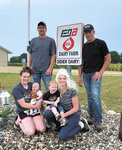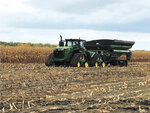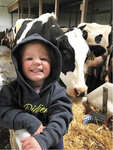


OSAKIS, Minn. — Conservation has always been at the forefront of Didier Farms LLC and Didier Dairy LLC, incorporating cover crops, no-till practices and other environmentally friendly methods. The Didiers also work with the Todd County Soil and Water Conservation District for the farm’s manure management plan. These reasons and others are why the Didier family was named Todd County’s 2023 Outstanding Conservationists.
Gerryl “Fritz” Didier, his wife, Sharon, and their two grown children, Nick Didier and Kayla Bromenshenkel, all work together and have ownership in the farm near Osakis.
“Everybody takes care of their farm and land for the next generation,” Fritz said.
Sharon agreed.
“It’s just what we do,” she said.
Sharon and Kayla manage the 120 cows that are milked with robotic milking units, while Fritz and Nick handle fieldwork — 1,250 acres of corn, soybeans, alfalfa and wheat. They also operate a custom planting and chopping business.
After Nick graduated from high school, he went to college for diesel mechanics. Kayla went to college for dairy management. Today, they are both using their skillsets to farm full time with their parents.
“My driving force is to keep the farm in the family and pass it onto the next generation,” Fritz said. “A lot of people have asked me what I did to get my kids to stay on the farm. I didn’t do anything special; they were with my wife and I all the time. They chose to come back to the farm on their own.”
The Didier farm has been in the family since 1911. Each generation has passed on an appreciation for the farm’s land, dedication to quality animal care and a sense of community for helping neighbors in times of need.
Trying new things is a mainstay for the Didiers, who often try emerging conservation methods on their farm before others do. They were considered pioneers when they utilized reduced tillage in the 1980s, a new concept to most farmers then. By 1990, the Didiers stopped plowing their ground altogether, using a ripper on some of their ground while experimenting with no till in their soybean fields.
“I have been experimenting with no till since the early 1990s,” Fritz said. “One year, we had a lot of erosion in this one field, and then I started using the ripper or using crops. I have not had any problems with erosion. It works great on lighter ground.”
In the years since, the Didiers have worked with the local SWCD to regulate both their manure and irrigation management. The Didiers worked closely with the SWCD in 2015 when they built their robot barn and redid their manure pit. Having land right up against the Sauk River and Guernsey Lake made the Didiers even more determined to be good stewards of the land. They have their soil moisture tested weekly during the growing season to help them regulate the variable rates of their irrigators.
Maintaining soil health is important to the Didiers, and they have taken several measures to preserve their soil and prevent erosion. Some of their acreage is highly erodible land, and they follow an HEL management plan to decide crop rotation, tillage methods and cover crops.
Earlier this year, the Didiers used cover crops on their HEL, planting rye, triticale and oats. They put up ryelage and oatlage this year from cover crops. They also have land enrolled in the Conservation Reserve Program and have adopted modern techniques such as transitioning their equipment to having tracks instead of tires to reduce soil compaction and using GPS to better manage their crops.
Even when doing custom work, the Didiers make sure to do the best job that they can.
“I do a lot of custom work, planting and harvesting, and I want to do the best job possible for the people I plant and harvest for,” Fritz said. “I told myself that if I’m going to be a farmer, I’m going to do it with nice machinery.”
The Didiers family has a strong sense of community and plays an active role with various community organizations. They have hosted farm tours for conservation organizations to share about their practices. Their reach goes beyond their own community in that they have hosted visitors from abroad on several occasions.
“They liked seeing the cows and the robots,” Fritz said.
As the Didiers look to the future, they are letting their children make more of the decisions. That is why they recently formed a limited liability company so that Fritz, Sharon, Nick and Kayla would each have ownership in the farm.
“We communicate very well,” Fritz said. “That is keeping us thriving.”
Fritz said he is lucky to be able to farm each and every day.
“It doesn’t get any better than this — farming with my kids and my grandkids by my side,” Fritz said. “It’s awesome.”
Comments
No comments on this item Please log in to comment by clicking here